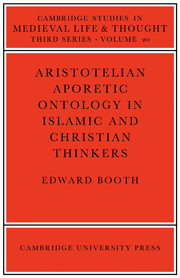Book contents
- Frontmatter
- Contents
- Preface
- Abbreviations
- 1 ARISTOTLE'S APORETIC ONTOLOGY AND THE RADICAL ARISTOTELIAN TRADITION
- 2 THE NEOPLATONIST INTERPRETATION OF ARISTOTLE'S ONTOLOGY
- 3 THE CHRISTIAN ARISTOTELIAN REACTION OF THE SIXTH CENTURY AND MONOTHEIST MODIFICATIONS TO THE NEOPLATONIST LEGACY
- 4 THE ARAB PERIPATETICS: AL-FĀRĀBĪ, IBN SĪNĀ AND IBN RUSHD; AND THE JEWISH PERIPATETICS: ABRAHAM BEN DAVID AND MOSES MAIMONIDES
- STASIMON: THE INTRODUCTION OF THE ‘NEW’ ARISTOTLE AND THE ARAB PERIPATETICS TO MEDIEVAL CHRISTENDOM
- Conclusion
- Appendix
- Bibliography
- Index
2 - THE NEOPLATONIST INTERPRETATION OF ARISTOTLE'S ONTOLOGY
Published online by Cambridge University Press: 05 November 2011
- Frontmatter
- Contents
- Preface
- Abbreviations
- 1 ARISTOTLE'S APORETIC ONTOLOGY AND THE RADICAL ARISTOTELIAN TRADITION
- 2 THE NEOPLATONIST INTERPRETATION OF ARISTOTLE'S ONTOLOGY
- 3 THE CHRISTIAN ARISTOTELIAN REACTION OF THE SIXTH CENTURY AND MONOTHEIST MODIFICATIONS TO THE NEOPLATONIST LEGACY
- 4 THE ARAB PERIPATETICS: AL-FĀRĀBĪ, IBN SĪNĀ AND IBN RUSHD; AND THE JEWISH PERIPATETICS: ABRAHAM BEN DAVID AND MOSES MAIMONIDES
- STASIMON: THE INTRODUCTION OF THE ‘NEW’ ARISTOTLE AND THE ARAB PERIPATETICS TO MEDIEVAL CHRISTENDOM
- Conclusion
- Appendix
- Bibliography
- Index
Summary
PLOTINUS'S ONTOLOGY
In coming to an understanding of the Aristotelian aporetic and the hermeneutic modification made to it by commentators of the radical tradition, the parallel problem posed by Plato's writings cannot be forgotten. Here the work of assimilation was more difficult because the tentativeness and the ironic disclaimers, not to mention the more literary style of the dialogues, left the reader with less of a structure to fall back on than Aristotle's corpus. What is remarkable about the thought of Plotinus (c. 205–270) is the plausibility with which he extracted a coherent system from them, though it would not be sufficient to characterise his work as an essay in system-building: it is, in close sympathy with the original, too charged with contemplative content.
Plotinus reproduced not only the Platonist dialectical ascent to the One – which was ‘beyond being’, but through a kind of structural reversal, made the object of his search the centre of a noetic system, wherein the overflow of power of the One, which was the source of everything else, emanated the hypostasis of νοῦς which, identified with every νοητόν in a paradoxical one-manyness in what was ‘true being’, was bound together in self-knowing, through which it tried to return to the pure unity of its source.
- Type
- Chapter
- Information
- Publisher: Cambridge University PressPrint publication year: 1983



